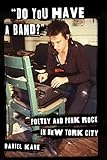"Do You Have a Band?" : Poetry and Punk Rock in New York City / Daniel Kane.
Material type: TextPublisher: New York, NY : Columbia University Press, [2017]Copyright date: ©2017Description: 1 online resource (288 p.) : 11 b&w photographsContent type:
TextPublisher: New York, NY : Columbia University Press, [2017]Copyright date: ©2017Description: 1 online resource (288 p.) : 11 b&w photographsContent type: - 9780231162968
- 9780231544603
- American poetry -- 20th century -- History and criticism
- American poetry -- New York (State) -- New York -- History and criticism
- Punk culture -- New York (State) -- New York -- History -- 20th century
- Punk rock music -- New York (State) -- New York -- History -- 20th century
- LITERARY CRITICISM / American / General
- 811.540997471 23
- PS255.N5 K363 2019
- online - DeGruyter
| Item type | Current library | Call number | URL | Status | Notes | Barcode | |
|---|---|---|---|---|---|---|---|
 eBook
eBook
|
Biblioteca "Angelicum" Pont. Univ. S.Tommaso d'Aquino Nuvola online | online - DeGruyter (Browse shelf(Opens below)) | Online access | Not for loan (Accesso limitato) | Accesso per gli utenti autorizzati / Access for authorized users | (dgr)9780231544603 |
Frontmatter -- Contents -- Acknowledgments -- Introduction -- ONE. The Fugs Are Coming -- TWO. Lou Reed: "In the Beginning Was the Word" -- THREE. Proto-Punk and Poetry on St. Mark's Place -- FOUR. Richard Hell, Genesis: Grasp, and the Making of the Blank Generation -- FIVE. "I Just Got Different Theories": Patti Smith and the New York School of Poetry -- SIX. Giorno Poetry Systems -- SEVEN. Eileen Myles and the International Fuck Frank O'Hara Movement -- EIGHT. "Sit on My Face!": Dennis Cooper, the First Punk Poet -- Afterword: People Who Died -- Notes -- Index
restricted access online access with authorization star
http://purl.org/coar/access_right/c_16ec
During the late 1960s, throughout the 1970s, and into the 1980s, New York City poets and musicians played together, published each other, and inspired one another to create groundbreaking art. In "Do You Have a Band?", Daniel Kane reads deeply across poetry and punk music to capture this compelling exchange and its challenge to the status of the visionary artist, the cultural capital of poetry, and the lines dividing sung lyric from page-bound poem.Kane reveals how the new sounds of proto-punk and punk music found their way into the poetry of the 1960s and 1970s downtown scene, enabling writers to develop fresh ideas for their own poetics and performance styles. Likewise, groups like The Fugs and the Velvet Underground drew on writers as varied as William Blake and Delmore Schwartz for their lyrics. Drawing on a range of archival materials and oral interviews, Kane also shows how and why punk musicians drew on and resisted French Symbolist writing, the vatic resonance of the Beat chant, and, most surprisingly and complexly, the New York Schools of poetry. In bringing together the music and writing of Richard Hell, Patti Smith, and Jim Carroll with readings of poetry by Anne Waldman, Eileen Myles, Ted Berrigan, John Giorno, and Dennis Cooper, Kane provides a fascinating history of this crucial period in postwar American culture and the cultural life of New York City.
Mode of access: Internet via World Wide Web.
In English.
Description based on online resource; title from PDF title page (publisher's Web site, viewed 25. Jun 2024)


